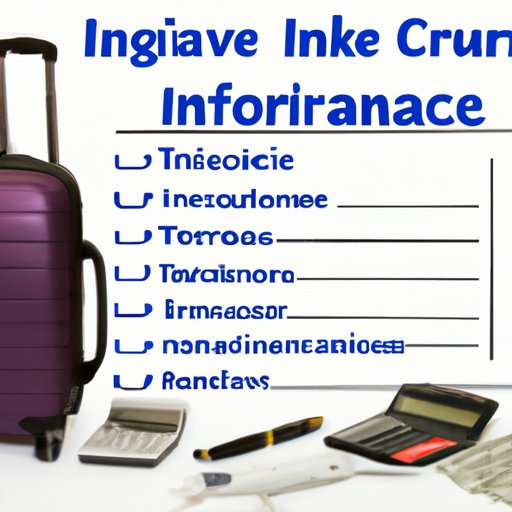Introduction
Business travel insurance is designed to protect individuals or companies who are travelling for business-related purposes. It provides cover in the event of medical emergencies, lost luggage, flight cancellations and other unexpected events that may occur while travelling.
It’s important to understand the basics of business travel insurance before deciding whether it’s right for you. This article will look at what business travel insurance covers, how to choose the right provider, the costs and risks associated with it, common claims made under the policy, and how to compare different plans.
Explaining the Basics of Business Travel Insurance
Business travel insurance is often referred to as corporate travel insurance, and is designed to provide financial protection for businesses or individuals travelling for business purposes. It covers a range of potential problems that could arise during the trip, such as medical emergencies, lost luggage, flight cancellations and delays, and other unforeseen events.
What Does Business Travel Insurance Cover?
The exact coverage provided by business travel insurance depends on the policy purchased. Generally speaking, it covers the following:
- Medical expenses, including hospital stays and emergency medical treatment
- Lost or stolen luggage and personal effects
- Cancellation or interruption of the trip due to illness or injury
- Flight cancellation or delay
- Accidental death or dismemberment
- Legal liability for injury or property damage caused by the insured
Benefits of Business Travel Insurance
Business travel insurance provides peace of mind for those travelling for business purposes. It can help cover the costs of medical emergencies, lost or stolen items, and flight cancellations or delays. It also offers legal liability protection in the event of an accident or injury caused by the insured.
How to Choose the Right Business Travel Insurance Provider
When looking for a business travel insurance provider, it’s important to do your research to ensure you get the best possible coverage for your needs. Here are some factors to consider when searching for the right provider:
- Cost: Compare the cost of different policies to ensure you get the best value for money.
- Coverage: Make sure the policy covers all the risks associated with your business trips.
- Claims process: Check how long it takes for claims to be processed and how easy the process is.
- Customer service: Look for a provider with good customer service and a reputation for resolving claims quickly and efficiently.
It’s also important to research different providers to make sure you find the best deal. Read reviews of different companies and check their websites to see what coverage they offer.

Costs and Risks Associated with Business Travel Insurance
Business travel insurance is generally quite affordable, but there are still costs associated with it. The cost of the policy will depend on the type of coverage you choose, the length of the trip, and the destination.
Common Costs
The most common costs associated with business travel insurance include the following:
- Premium: This is the cost of the policy itself, which can vary depending on the type of coverage chosen.
- Deductible: This is the amount you must pay out-of-pocket before the insurance company begins to cover the costs.
- Excess: This is the amount you must pay for any claim you make.
Common Risks
There are also certain risks associated with business travel insurance, including the following:
- Pre-existing conditions: Some policies may not cover pre-existing medical conditions.
- High-risk activities: Some policies may not cover high-risk activities such as skydiving or bungee jumping.
- Delay or cancellation: Some policies may not cover delays or cancellations due to weather or other causes beyond the insured’s control.

Common Claims Made Under Business Travel Insurance
Business travel insurance can be used to cover a wide range of potential problems that could arise while travelling. Here are some examples of typical claims made under business travel insurance policies:
- Medical expenses: If a traveller falls ill or is injured while away from home, the policy will cover the cost of medical treatment.
- Lost or stolen items: If a traveller’s luggage is lost or stolen, the policy will cover the cost of replacing it.
- Flight cancellation or delay: If a flight is cancelled or delayed, the policy will cover the cost of alternative arrangements.
- Accidents: If a traveller is involved in an accident, the policy will cover the cost of legal fees and damages.
How Claims are Processed
In order to make a claim under a business travel insurance policy, the traveller will need to provide proof of the incident, such as medical records, police reports, or receipts. The insurer will then assess the claim and decide whether or not to pay out. Depending on the policy, payments may be made directly to the traveller or to the medical provider or other third party.

A Comparison of Different Business Travel Insurance Plans
There are many different types of business travel insurance plans available, so it’s important to compare them to find the right one for your needs. Here are some of the most common types of plans:
- Basic: This is the most basic type of plan, which offers basic coverage such as medical expenses and lost or stolen items.
- Comprehensive: This type of plan offers more extensive coverage, including flight cancellations, delays, and accidental death or dismemberment.
- Group: Group plans are designed for organisations that need to insure multiple travellers at once.
Comparing Costs and Coverage
When comparing different plans, it’s important to consider both the cost and the coverage offered. For example, a comprehensive plan may offer more coverage than a basic plan, but it may also be more expensive. It’s important to weigh up the cost and the coverage to find the best option for your needs.
Conclusion
Business travel insurance is designed to provide financial protection for those travelling for business purposes. It covers a range of potential problems, such as medical expenses, lost or stolen items, flight cancellations and delays, and legal liability. When choosing a business travel insurance provider, it’s important to do your research to ensure you get the best possible coverage for your needs. Additionally, it’s important to compare different plans to find the right one for your needs.
(Note: Is this article not meeting your expectations? Do you have knowledge or insights to share? Unlock new opportunities and expand your reach by joining our authors team. Click Registration to join us and share your expertise with our readers.)
